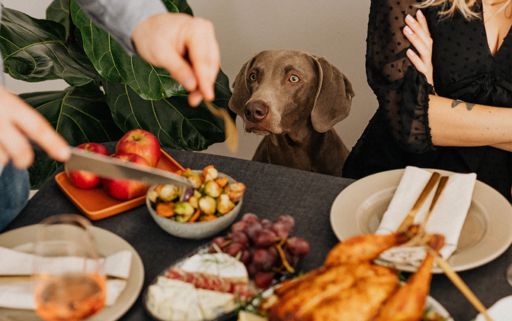- Turkey: While turkey might make humans feel satisfied and a bit sleepy, sharing it with dogs can lead to severe illness. It’s important to steer clear of offering your dog either cooked or raw turkey. Although small portions of lean white meat are generally safe for dogs and cats, it’s essential to avoid giving them red meat, fatty parts, and the skin. Cases of pets suffering from pancreatitis (inflammation of the pancreas) after consuming high-fat foods are common after Thanksgiving dinners. To prevent this, it’s best to play it safe and not share turkey with your pets.
- Turkey Bones: While bones are typically digestible, ingesting small, sharp bone fragments can lead to stomach and intestinal trauma, and even perforation. Therefore, it’s important to keep turkey bones out of your pet’s reach to ensure their safety.
- Salads with Grapes/Raisins: Grapes and raisins are highly toxic to animals and can potentially lead to fatal kidney failure. To safeguard your pets, it’s essential to keep grapes and raisins out of their reach, even by storing them in places that curious noses cannot access.
- Mashed Potatoes: While plain potatoes are generally safe for pets, the addition of butter, milk, and other ingredients in mashed potatoes can increase the risk of pancreatitis. Moreover, mashed potatoes often contain garlic and onions, which are toxic to pets.
- Bread Dough: As tempting as it might be to share bread dough with your dog, it’s crucial to refrain from doing so. Unbaked bread dough can expand within the stomach, leading to a dangerous condition known as bloat. Additionally, raw dough can cause ethanol (alcohol) toxicity, posing serious health risks to your pet.
Foods to Avoid Giving Your Pet:
Alcohol: Avoid giving any alcohol to your pet, as it can cause vomiting, diarrhea, coordination issues, central nervous system depression, difficulty breathing, tremors, abnormal blood acidity, coma, and death. Contact your veterinarian or the ASPCA Animal Poison Control Center immediately if ingestion is suspected.
Avocado: Problematic for birds, rabbits, donkeys, horses, and ruminants, avocado can cause cardiovascular damage and death in birds and rabbits. Horses, donkeys, and ruminants may experience swollen, edematous head and neck.
Chocolate, Coffee, and Caffeine: Methylxanthines in chocolate, coffee, and caffeine-containing products can lead to vomiting, diarrhea, panting, excessive thirst and urination, hyperactivity, abnormal heart rhythm, tremors, seizures, and death. Dark chocolate is more dangerous than milk chocolate, with white chocolate having the lowest risk.
Citrus: Citrus plants’ stems, leaves, peels, fruit, and seeds contain citric acid and essential oils that may cause irritation and potential central nervous system depression if ingested in significant amounts.
Coconut and Coconut Oil: While small amounts are generally safe, excessive consumption may cause stomach upset, loose stools, or diarrhea. Caution is advised, and coconut water, high in potassium, should be avoided.
Grapes and Raisins: These fruits can cause kidney failure in dogs, and their toxic substance remains unknown. It’s best to avoid feeding grapes and raisins to dogs.
Macadamia Nuts: Ingestion can lead to weakness, depression, vomiting, tremors, and hyperthermia in dogs. Symptoms typically appear within 12 hours and last approximately 24 to 48 hours.
Milk and Dairy: Due to a lack of significant lactase, milk and dairy-based products can cause diarrhea and digestive upset in pets.
Nuts: Almonds, pecans, and walnuts, rich in oils and fats, can lead to vomiting, diarrhea, and potentially pancreatitis in pets.
Onions, Garlic, Chives: These vegetables and herbs may cause gastrointestinal irritation, red blood cell damage, and anemia in pets.
Raw/Undercooked Meat, Eggs, and Bones: Raw meat and eggs may contain harmful bacteria, and bones pose choking and injury risks. Raw bones can splinter, causing digestive tract issues.
Salt and Salty Snack Foods: Excessive salt intake can result in thirst, urination, and sodium ion poisoning. Avoid feeding salt-heavy snacks like chips, pretzels, and salted popcorn.
Xylitol: Found in gum, candy, baked goods, and toothpaste, xylitol can cause insulin release, leading to liver failure, hypoglycemia, vomiting, lethargy, loss of coordination, seizures, and elevated liver enzymes.
Yeast Dough: Rising yeast dough can cause gas accumulation, leading to bloating and a life-threatening emergency. Ethanol production in the process can intoxicate pets.
This Thanksgiving, let’s prioritize the well-being of our pets by avoiding the sharing of these potentially harmful foods. By following these guidelines, we can ensure a safe and enjoyable holiday season for our entire family, furry friends included.
Have a safe and meaningful Holiday,
Your neighborly Vet,


